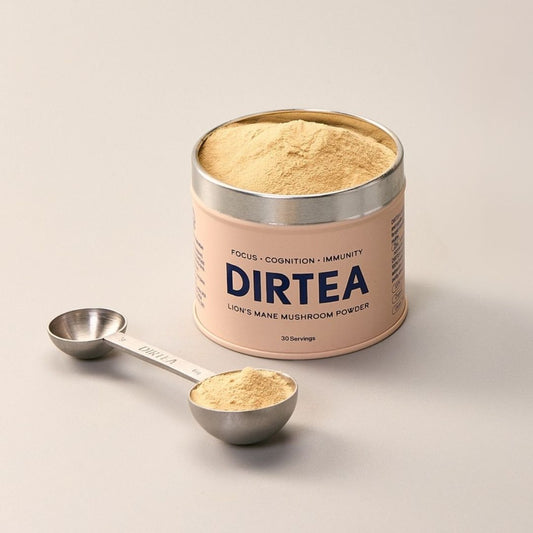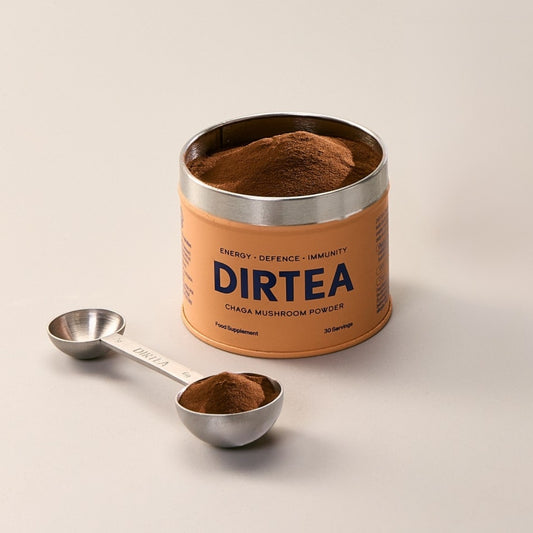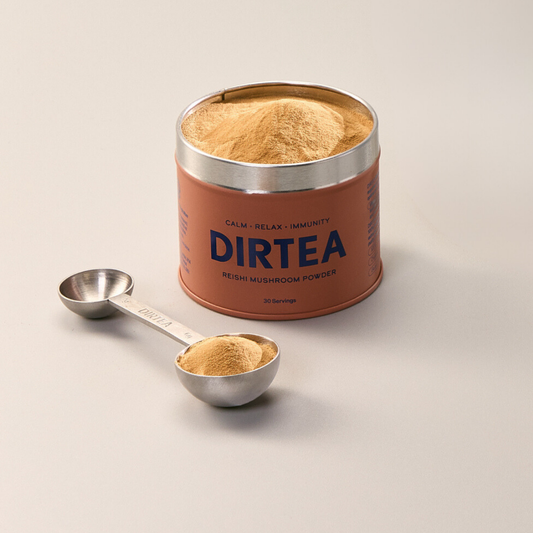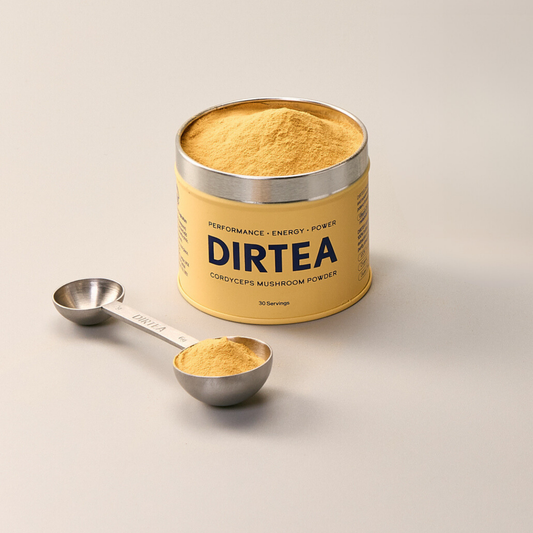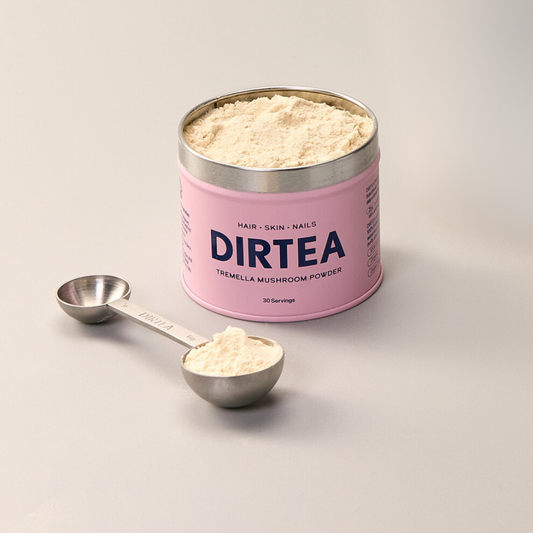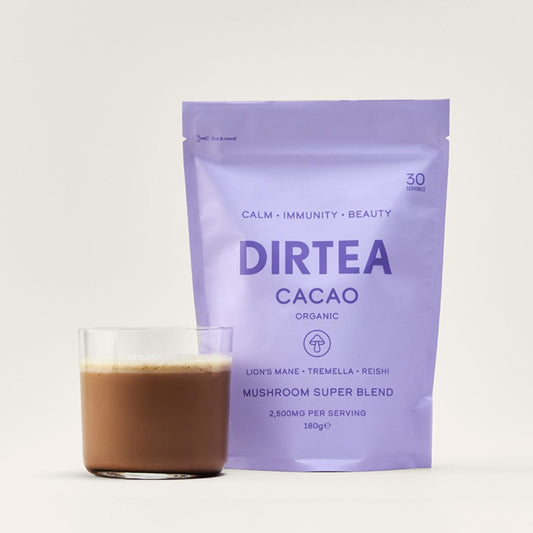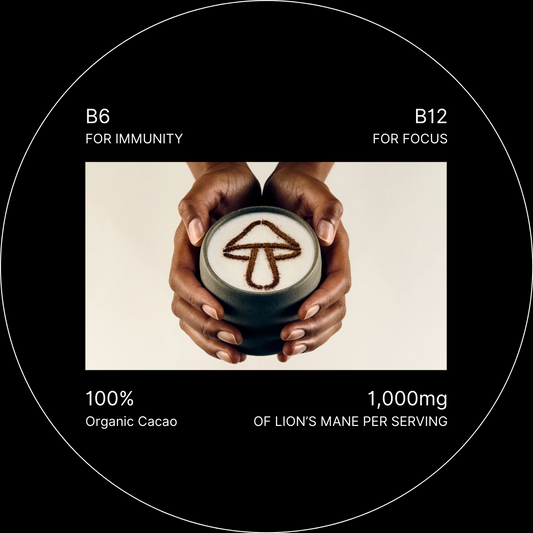Top Health Tips for the Winter Season with Functional Mushrooms

Share
How to Take Care of Your Health During Winter With Functional Mushrooms
The winter season has set in, often accompanied by comfy blankets and perhaps a cup of our DIRTEA Cacao to get you all warm and cosy.
This time of year also brings about certain health challenges, from colds and flu to lethargy and low-moods.
So when thinking about how to take care of your health during winter, consider these essential health tips for the winter season. Coupled with functional mushrooms, they should help keep your health optimal.
Why not try one of our Super Blends packed with adaptogens and vitamins for immune support, energy and focus.
#1: PRIORITISE IMMUNE SUPPORT
The colder months often coincide with an increased susceptibility to illnesses.
An article in CNN Health explains that colds are more common in winter months due to the drop in temperature. A 2022 study published in The Journal of Allergy and Clinical Immunology finds that reducing the temperature inside the nose by as little as 9 degrees Fahrenheit (5 degrees Celsius) kills nearly 50% of the billions of helpful bacteria-fighting cells and viruses in the nostrils.(1)
To adapt your immune system and take care of your health during winter, focus on a balanced diet rich in vitamins and minerals.
Incorporate functional mushrooms like Reishi, which contain polysaccharides and beta-glucans, which may help fortify the body's defences against colds and put your body into its ready state.
#2: HYDRATION IS KEY
The dry winter air and indoor heating can dehydrate your body.
While the temptation to indulge in hot beverages like coffee and tea is strong during winter, remember to drink ample water.
Did you know that dehydration (even mild dehydration) can negatively impact physical performance, alertness, and cognitive focus, thereby causing “brain fog?”
To ensure proper hydration, you should consume 8 oz (237 mL) of fluid per hour for the first 10 hours of your day. A health tip during winter is to keep a glass of water by your bed and make it the first thing you drink.
Consider sipping on herbal teas infused with Chaga mushroom extract (or even a Chaga tea on its own), renowned for their antioxidant content. This mushroom powerhouse not only supports overall well-being and hydration but has a lovely earthy taste.
#3: MAINTAIN PHYSICAL ACTIVITY
It's easy to slip into a sedentary lifestyle during colder months, but when thinking about how to take care of your health during winter, staying active is crucial.
In one study from 2011, 1,000 people were studied for three months by tracking their lifestyles, such as diet, exercise, and exposure to stressful events, and how often they were sick, such as upper respiratory tract infection – for instance, the common cold.(2)
It was found that those who exercised five or more days per week were 43% less likely to be sick with an upper respiratory.
To aid post-exercise recovery, consider consuming Cordyceps mushrooms. Not only do they have a spectacular nutty taste, but they also contain Cordycepin, which may enhance stamina and endurance.
#4: EMBRACE NUTRIENT-DENSE FOODS
Warm and hearty meals are comforting, but when thinking about how to take care of your health during winter, choosing the right foods will help support your immune system better.
Opting for nutrient-dense foods rich in vitamins, minerals, and antioxidants is crucial.
Incorporating seasonal produce like root vegetables (sweet potatoes, carrots, beets), winter squashes, dark leafy greens (kale, spinach), citrus fruits (oranges, grapefruits), and cruciferous vegetables (broccoli, cauliflower) can provide essential vitamins such as vitamin C, vitamin K, and antioxidants.
Another health tip for the winter season is incorporating protein-rich foods like lean meats, fish, beans, lentils, and nuts, which help maintain energy levels and support muscle health.
Healthy fats found in avocados, olive oil, nuts, and seeds are beneficial for maintaining skin health and providing sustained energy.
Finally, warm spices like ginger, turmeric, cinnamon, and garlic add flavour and offer potential immune-boosting and anti-inflammatory properties.
#5: PRIORITISE REST AND STRESS MANAGEMENT
When thinking about how to take care of your health during winter, remember that the holiday season can increase your stress.
Ensure you get adequate rest and practice stress-relieving activities like meditation, yoga, and walks in nature.
Another underrated health tip during winter is taking time for yourself. This could be something as simple as a candlelit bath or reading your favourite books.
Lion's Mane and Reishi mushrooms are believed to possess adaptogenic properties that may help keep your mind rested and promote relaxation.
#6: ENSURE ADEQUATE SUNLIGHT AND VITAMIN D
With shorter days, getting enough sunlight becomes crucial.
Spend time outdoors when possible and consider supplementing with vitamin D, which plays a vital role in maintaining immune function and mood regulation.
A recent study suggests that approximately 1 billion people worldwide are affected by vitamin D deficiency, and around 50% of the global population has vitamin D insufficiency.(3)
Eating foods that are rich in vitamin D will also help.(4) Interestingly, mushrooms are the only non-animal species to secrete vitamin D.
Consult a Healthcare Professional
Before incorporating any new supplements or significant changes to your diet, it's advisable to consult a healthcare professional, especially if you have underlying health conditions or are taking medications.
By combining these health tips for the winter season with the goodness of functional mushrooms, you can fortify your body's defences, boost immunity, and enhance overall wellness during the chilly season.
Remember that a holistic approach to health, incorporating diet, exercise, rest, and natural supplements, can go a long way in ensuring your well-being throughout winter.
Stay warm, stay healthy, and embrace the magic of the winter season!
References
- CNN Health (2023). Scientists Finally Know Why People Get More Colds and Flu in Winter. Available at: https://edition.cnn.com/2022/12/06/health/why-winter-colds-flu-wellness/index.html (Accessed: 3 January 2023)
- Nieman, D.C., Henson, D.A., Austin, M.D., and Sha, W. (2011) ‘Upper Respiratory Tract Infection Is Reduced in Physically Fit and Active Adults’ British Journal of Sports Medicine. 45 pp.987-992.
- Siddiqee, M.H., Bhattacharjee, B., Siddiqi, U.R. and MeshbahurRahman. M. (2021) ‘High Prevalence of Vitamin D deficiency Among the South Asian adults: a Systematic Review and Meta-Analysis’. BMC Public Health. 21,pp.1823.https://doi.org/10.1186/s12889-021-11888-1.
- Keegan, R.J., Lu, Z., Bogusz, J,M., Williams, J.E., and Holick, M.F. (2013).‘Photobiology of Vitamin D in Mushrooms and its Bioavailability in Humans’. Dermatoendocrinol. 5(1), pp.165-76. doi: 10.4161/derm.23321.






